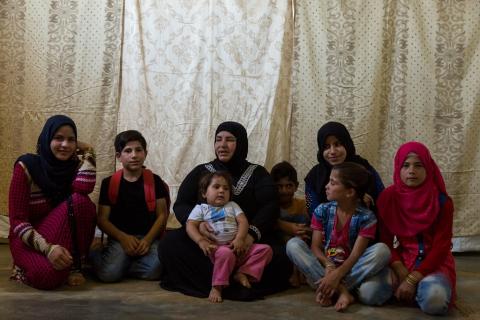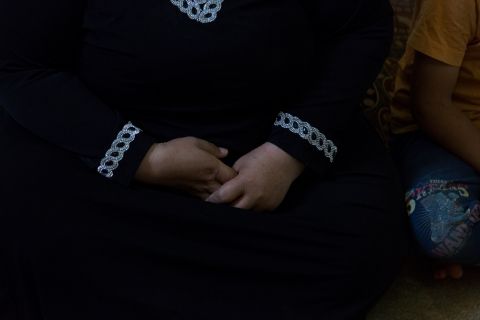Sourayya’s story: From a home with flowers to a muddy settlement

Sourayya’s garden was her own safe haven. No one but her was allowed to take care of the lemon trees, the vines, and flowers. Her house was very dear to heart as well. A surface area of 212 meters included six bedrooms, a big kitchen, and two bathrooms. “Imagine what it felt like to be accustomed to all this, and then having to leave it all behind”, said the 40-year-old mother of six.

Sourayya’s family held their ground until 2014. When things got rough, they moved around Aleppo. “We fled our house twice, but we remained in Syria,” she recalled, “We tried our hardest to protect our belongings and not to leave our country.” Sourayya was well aware that once she decides to escape the war in Syria, her whole life would change, and she was avoiding it. “The third time we left the house, I just knew in my heart that there was no going back,” she remembered. The battles in her neighborhood got too intense, and her children were severely scared. Ahmad was one, Hamza was five, Youness was seven, Mhammad was ten, Safaa’ was 13, and Aahed was 16. Her husband Fares contacted his relatives in Lebanon and informed them that he will be arriving in a couple of days, as it was hard for him to determine whether the journey would be a smooth one or not. His relatives, who also sought refuge in Lebanon, advised him to head to an informal tented settlement in the Bekaa area.
It was a cold post-storm January morning, when Sourayya, Fares and their children arrived to the settlement. “I shouted ‘there is no way on earth I will live here’ the minute I saw the condition the settlement was in,” Sourayya admitted. Fares tried to calm her down and explain to her that this would be temporary. “Some tents were broken, everything was muddy, and there was dirt all over the place. It struck me that my children will have to endure this, and this depressed me,” said Sourayya. The first time Sourayya stepped in their tent, she looked for the bathroom. To her surprise, there was no bathroom installed. The first couple of weeks were very hard on the family, as it was hard for them to settle down and know their way around. “My children were in need of potable water. The first couple of times I asked my neighbors and then people stopped sharing with us,” Sourayya recalled. All she could think about is how the lack of hygiene could affect her children’s health and what dehydration can do to them. A while later, World Vision, through its WASH team (Water, Sanitation, and Hygiene) learned that Fares and Sourayya’s family is not receiving any water-related assistance. They registered their names and promised to help. The latrine was installed a couple of days later. “This latrine was a life-saver,” she smiled and continued. “However, none of the people residing in the settlements, including myself, would have properly maintained good hygiene if it weren’t for the many awareness sessions we received.” Almost 5000 families benefitted from these sessions provided by World Vision as part of the WASH project. Funded by UNICEF, the project consisted of hygiene awareness sessions aiming to help improve the hygiene behavior of refugees residing in the settlements. “I believe that it was highly beneficial for children to know how to wash their hands and keep themselves clean, or else God knows what diseases they’d be facing with a lifestyle like this,” said Sourayya. She learned to cope with the hardships of the new settlement lifestyle. Three years later, Sourayya gained a reputation of having the cleanest tent in her surrounding and succeeded in raising children who share the passion for hygiene just as she does.

Many Syrian refugee women experienced loss in the Syria war. Some have lost their husbands or children. And some have lost part of who they are as Sourayya says. Mothers like Sourayya, who lost their houses and “private territories”, are still struggling to keep their children healthy and safe against all odds.